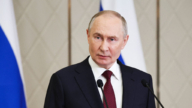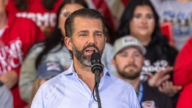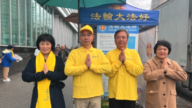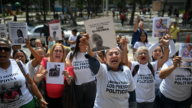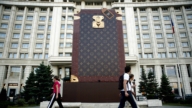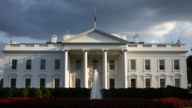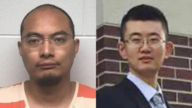【新唐人2011年4月14日讯】日本原子力安全保安院4月12号,决定将福岛第一核电站核泄漏事故的等级从5级提高到7级,引起全球震惊。中国作为世界上核电在建规模最大的国家,尽管大陆官方一再保证“核安全”,但民众依旧议论不断。下面就来看看专家如何解读中国的“核安全”。
日本将福岛核泄漏事故等级,从5级提高到7级,这已经是国际核能事故等级中的最高级别。与前苏联“切尔诺贝利核事故”“同级”。
目前旅居日本的、前中国环境保护部核与辐射安全中心研究员李旭彤博士,对比分析了中日双方的核安全监管体制。他介绍说,这次核灾难曝露了日本的监管机构、核安全保安院不够独立,所以无法及时、有效的保护国民生命安全,所以日本正考虑改革核安全监管体制。
李旭彤博士(前中国环境保护部核与辐射安全中心研究员):“相对比,中国在核安全监管、监督机构上,更加不独立,很多情况下,更会受到方方面面因素的影响。”
上世纪80年代,前苏联“切尔诺贝利核电站”爆炸,事故释放的辐射物,相当于10个广岛原子弹,约有320万人受到核辐射的侵害,核辐射进入云层中,覆盖了30个国家。
有专家指出,目前日本福岛核电站放射性物质的泄漏,还没有完全停止,担心最终泄漏量,可能与“切尔诺贝利核事故”相当,甚至更多。
中共国家能源委员会专家咨询委员会主任张国宝公开表示,不能因为日本出现核灾难,而因噎废食,影响中国核电发展。他说,只要技术先进,9级强震下,中国核电站是有安全保障的。不过,许多专家抱持怀疑的态度。
现年四十九岁的李旭彤博士,曾在国家环保总局核安全中心,担任教授级研究员多年,发表过五十多篇学术论文,四次获得国家部级、省级科研的进步奖。他指出,目前在中国核安全监管机构里的工作人员,很多人没有足够的经验使用国际先进技术,去监督核安。
李旭彤博士:“日本和一些其他核电发达国家,核安全监管机构,都有很多在研发、设计和运行经验的人、有丰富经验的人,来担当核安全监督工作,中国现在这样的人员很少,多数都是从学校出来做这种核安全监督工作,没有经验,很难形成真正的监督能力。”
有大陆媒体报导,中国从1984年开始起草的《原子能法》,到现在也没有立法,也就是说,中国核安全方面至今“无法可依”。
作为研究核安全几十年的专家,李旭彤博士指出,中国现在大力发展核电,不能不让人担心。
李旭彤博士:“中国在议定决定引进美国的第三代反应堆、压水堆AP1000以后,又因为政治因素引入了法国第三代的EPR。中国目前正在运行的十二、三个反应堆的建造和引进,基本都基于政治因素的考虑,而不是仅仅基于技术和经济因素。”
李旭彤博士担心的是,将来中共当局是不是会为了政治因素,而牺牲核电的安全性,对中国老百姓造成伤害。
新唐人记者林平、赵心知、吴慧真采访报导。
Worries On China’s Nuclear Safety
At the time when Japan authorities upgraded
Fukushima’s nuclear crisis level from 5 to 7,
despite the repeated nuclear safety announcements,
public comments roused increasingly in China
on the awareness of China being the largest
country with nuclear power plants in the making.
The level 7 of Japan’s nuclear crisis is the highest
in world’s nuclear crisis record, apart of Chernobyl.
Li Xu Tong, Nuclear and Radiation Safety Fellow,
reported from Japan that the disaster had shown
Japan had a less independent mechanism
in national nuclear safety which resulted
in the inefficiency of its relief efforts. Japan officials
were on their way to reform this safety system.
Li Xu Tong: “In comparison, China has seen
even less independence in its nuclear safety system,
and is vulnerable to many other external influences.”
The Chernobyl crisis of last century endangered
3.2 million people with nuclear radiation emission,
10 times higher than the Hiroshima atomic bomb,
covering some 30 countries with its radiation.
Specialists announced that radioactive substances
were still leaking. There is a concern that the overall
quantity might outnumber that of Chernobyl.
Chinese Communist Party (CCP) National Energy
Commission Chief Director Zhang Guoqiang
spoke openly that China would not suspend any
development of nuclear plants. He asserted
that any earthquake with a less than 9 magnitude
would not affect the nuclear plants,
provided the technology was high enough.
Li Xu Tong, was a Senior Fellow
at the Nuclear department of the National
Environmental Protection Centre. He published
some 50 academic papers, and was awarded 4 times
the National and Provincial Progress Award.
He said there is a lack of specialists qualified to use
advanced technology to supervise nuclear security.
Li Xu Tong: “Japan and other nuclear advanced
countries are on their way to train and employ
experienced staff for nuclear security supervision.
China is less so, and most are only school graduates
who are less capable of doing real work.”
According to a Mainland media report,
Chinese officials began drafting
an Atomic Energy Law in 1984,
but have not yet completed it.
Professor Li Xu Tong said that the current ongoing
nuclear plants development in China is a problem.
Li Xu Tong: “After employing the American
third-generation reactor and PWR, China continued
with the third-generation EPR from France
for political reasons. The real problem is,
the current development of the 12th and 13th reactors
in China are for political reasons,
not based on technology or economy.”
He expressed concerns that in the future
CCP will continue to ignore the nuclear plants safety
and will still pursue only its political goals.
NTD reporters Lin Ping, Zhao Xinzhi and Wu Huizhen


